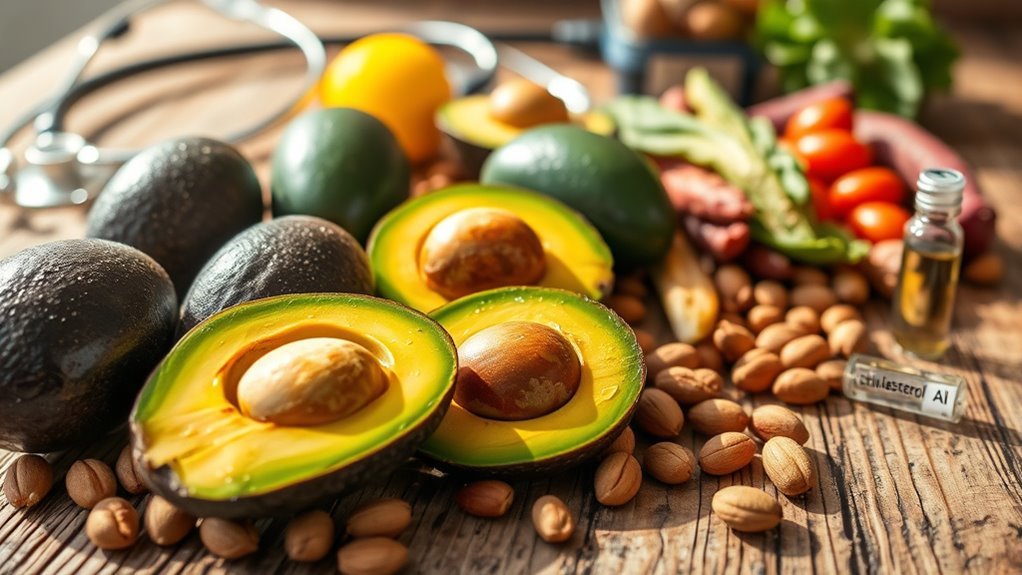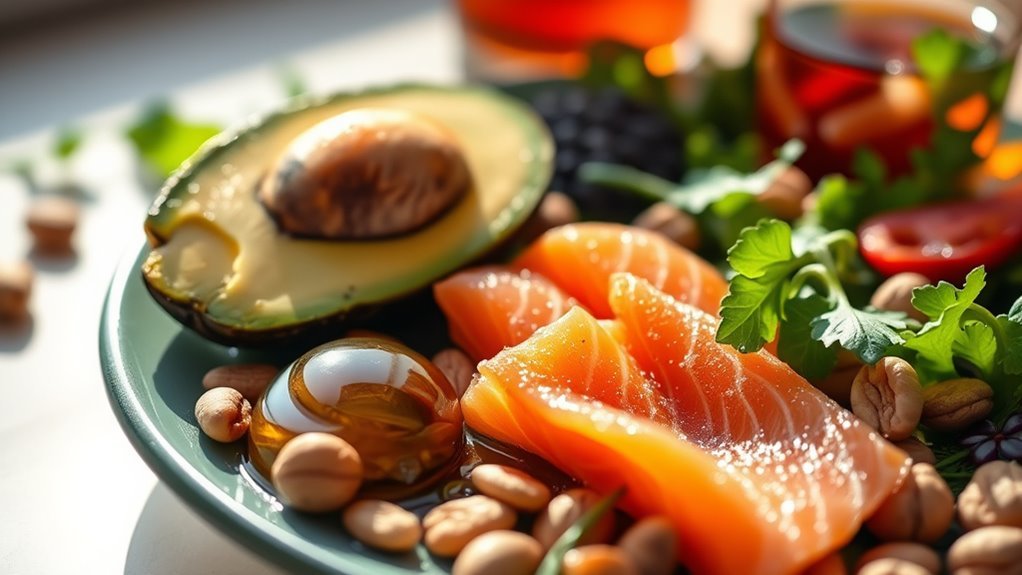The ketogenic diet can lead to varying changes in cholesterol levels. For some, it may increase LDL (“bad”) cholesterol while raising HDL (“good”) cholesterol. This response can differ based on individual factors like genetics and types of fats consumed. Regular monitoring of your cholesterol levels is important to understand these changes better. Understanding the nuances of how keto impacts cholesterol can help you make informed dietary choices for your heart health. There’s more to explore on this topic.
Understanding Cholesterol: LDL vs. HDL

When it comes to understanding cholesterol, it’s vital to distinguish between LDL and HDL, as both play different roles in your body. LDL, or low-density lipoprotein, is often labeled as “bad” cholesterol because it can lead to plaque buildup in your arteries, affecting blood flow. On the other hand, HDL, or high-density lipoprotein, is known as “good” cholesterol, as it helps remove LDL from the bloodstream, promoting healthier cholesterol metabolism. Monitoring your lipid profiles is important to assess your heart health. A balanced approach to managing these cholesterol types can empower you to make informed decisions about your diet and lifestyle, ensuring you maintain the best heart health while enjoying your freedom to choose what you eat.
The Basics of the Ketogenic Diet

The ketogenic diet is primarily characterized by its high-fat content, which shifts your body’s metabolism from burning carbohydrates to fats. When you greatly reduce carbohydrate intake, your body enters a state called ketosis, where it efficiently converts fat into energy. Understanding the role of high-fat foods and how ketosis impacts your metabolism is essential for maneuvering this dietary approach effectively.
High-Fat Foods Explained
Although many people associate high-fat foods with negative health outcomes, the ketogenic diet intentionally embraces these fats as a primary energy source. By focusing on high-fat benefits, you can shift your body into a state of ketosis, where it burns fat for fuel instead of carbohydrates. This dietary approach challenges common keto misconceptions that all fats are harmful. Healthy fats, like those found in avocados, nuts, and olive oil, can promote heart health and improve cholesterol levels. They also help keep you satiated, reducing cravings and aiding weight loss. Embracing these nutrient-dense foods not only supports your keto journey but also empowers you to make informed dietary choices that align with your health goals.
Ketosis and Metabolism
While many people may think of diets primarily regarding calorie restriction, the ketogenic diet fundamentally alters your metabolism by shifting your body’s primary energy source from carbohydrates to fats. This shift leads to a state called ketosis, where your body adapts metabolically to utilize fat for fuel. Here are some ketosis benefits you might experience:
- Increased fat burning
- Enhanced mental clarity
- Stable energy levels
- Appetite suppression
- Improved insulin sensitivity
This metabolic adaptation can make weight loss more sustainable and promote overall well-being. However, it’s crucial to approach the ketogenic diet mindfully, ensuring you’re meeting your nutritional needs while enjoying the freedom of a high-fat lifestyle. Always consult with a healthcare provider before making significant dietary changes.
How Keto Affects Lipid Metabolism

When you enter ketosis, your body shifts its energy source from carbohydrates to fats, which can greatly impact your lipid profile. Research shows that this dietary change often raises HDL (good) cholesterol while affecting LDL (bad) cholesterol levels in various ways. Understanding these shifts is key to managing your overall health on a ketogenic diet.
Ketosis and Lipid Profiles
As you begin a ketogenic diet, understanding how ketosis influences lipid metabolism is vital for managing your overall health. The ketosis impact on lipid profiles can vary, so it’s important to be informed. Here are some key aspects to take into account:
- Increased fat oxidation for energy
- Potential rise in total cholesterol levels
- Changes in triglyceride levels
- Variability in HDL and LDL cholesterol
- Individual responses may differ markedly
These factors can affect how your body processes fats and how they show up in your lipid profile. While many experience positive changes, it’s important to monitor your health markers regularly. Always consult with a healthcare professional to guarantee your approach aligns with your health goals and needs.
HDL vs. LDL Cholesterol
Understanding the distinction between HDL and LDL cholesterol is crucial, especially on a ketogenic diet, since these lipoproteins play different roles in your body. HDL, often dubbed “good” cholesterol, helps transport cholesterol away from your arteries, promoting cardiovascular health. Conversely, LDL, known as “bad” cholesterol, can lead to plaque buildup in your arteries if levels become too high. On a keto diet, your cholesterol metabolism can shift, potentially increasing LDL levels while raising HDL. This shift isn’t inherently negative, as higher HDL can mitigate some risks associated with raised LDL. Monitoring these changes through regular testing is essential, empowering you to make informed decisions about your health and dietary choices while enjoying the freedom of a ketogenic lifestyle.
The Role of Saturated Fats in Cholesterol Levels
Although saturated fats have long been vilified for their potential impact on cholesterol levels, recent research suggests that the relationship isn’t as straightforward as once thought. You might be surprised to learn that:
- Not all saturated fats affect cholesterol levels similarly.
- Some studies indicate they can raise HDL (good) cholesterol.
- The source of saturated fats (e.g., dairy vs. processed foods) matters.
- Individual responses to saturated fats vary based on genetics and lifestyle.
- Moderation and balance in your diet are vital.
Understanding saturated fats can empower you to make informed choices. Rather than fearing all saturated fats, consider their sources and context within your overall diet to support healthy cholesterol levels.
Research Studies on Keto and Cholesterol
While many people embrace the ketogenic diet for its weight loss benefits, research on its impact on cholesterol levels reveals a more complex picture. Various keto cholesterol research studies have shown that while some individuals experience increased LDL cholesterol, others see improvements in HDL cholesterol and overall lipid profiles. The dietary fat impact is significant; healthy fats can lead to favorable changes in cholesterol levels. Furthermore, some studies suggest that the type of dietary fats consumed matters, with unsaturated fats providing better outcomes than saturated fats. It is important to evaluate these findings as part of a broader context, balancing personal health goals with the potential effects of a keto diet on cardiovascular health.
Individual Variability in Cholesterol Response
The response to a ketogenic diet can vary considerably from person to person, particularly concerning cholesterol levels. Factors like cholesterol genetics and dietary influences play a significant role in this variability. Here are some key points to take into account:
The impact of a ketogenic diet on cholesterol varies greatly due to genetics and individual dietary habits.
- Genetic predisposition can affect how your body processes fats.
- Previous dietary habits might influence your cholesterol response on keto.
- Type of fats consumed (saturated vs. unsaturated) can lead to different outcomes.
- Overall health profile, including weight and existing conditions, impacts cholesterol levels.
- Individual metabolism can result in unique cholesterol changes.
Understanding these factors can empower you to navigate your keto journey while being mindful of how your body responds to dietary changes. Emphasizing a personalized approach is essential for achieving the best health.
Monitoring Cholesterol Levels on Keto
As you commence on a ketogenic diet, monitoring your cholesterol levels becomes essential to understanding how your body is responding to this significant dietary shift. During keto adaptation, your body undergoes metabolic changes that can impact lipid profiles. Regular cholesterol monitoring helps you track these changes and assess your overall health. It’s important to look at both total cholesterol and the breakdown of LDL and HDL levels. While some individuals experience increased LDL levels, others may see improvements in their HDL, which is often considered beneficial. By staying informed and adjusting your diet as needed, you empower yourself to make choices that align with your health goals. Always consult with a healthcare professional to interpret your results effectively.
Potential Benefits of a Keto Diet for Heart Health
Understanding your cholesterol levels on a ketogenic diet can reveal how this dietary approach may actually benefit heart health. Many people find that increased fat consumption on keto can lead to positive changes, including:
- Improved HDL cholesterol levels
- Reduced triglycerides
- Increased insulin sensitivity
- Potential weight loss benefits
- Enhanced overall metabolic health
While it’s important to monitor your cholesterol levels, research suggests that a well-formulated keto diet may support your heart health by promoting beneficial lipid profiles. This diet emphasizes quality fats, which can contribute to healthier cardiovascular outcomes. Embracing a keto lifestyle can offer you freedom in food choices while potentially enhancing your well-being, making it a compelling option for those seeking heart health improvements.
Dietary Sources of Healthy Fats
When considering a keto diet, it’s important to focus on healthy fat sources like avocados, olive oil, nuts, and seeds. These foods not only provide essential nutrients but can also support heart health by promoting healthier cholesterol levels. Incorporating a variety of these fats into your meals can enhance both flavor and nutritional value.
Avocado and Olive Oil
Incorporating healthy fats into your diet is essential for overall well-being, and two standout sources are avocados and olive oil. Both offer numerous benefits that can support your health journey.
Here are some key points to reflect on:
- Avocado benefits: Rich in monounsaturated fats, they support heart health and may lower cholesterol levels.
- Olive oil types: Extra virgin olive oil has higher antioxidants, promoting better health outcomes.
- Versatility: Both can be used in salads, cooking, or as spreads.
- Satiety: They help you feel full, reducing cravings.
- Nutrient absorption: Healthy fats enhance the absorption of fat-soluble vitamins.
Including avocados and olive oil can elevate your meals while contributing to a balanced, nutritious diet.
Nuts and Seeds
After exploring the benefits of avocados and olive oil, it’s clear that healthy fats play an essential role in a balanced diet. Nuts and seeds are fantastic sources of these healthy fats, offering a range of nut benefits like improved heart health and reduced inflammation. Almonds, walnuts, and pecans are just a few nut varieties that pack a powerful nutritional punch. Meanwhile, seed varieties like chia, flax, and pumpkin seeds provide fiber and omega-3 fatty acids. Including a variety of these foods in your diet can enhance overall well-being and support your keto journey. Just remember to enjoy them in moderation, as they’re calorie-dense, but with the right balance, they can be a liberating addition to your meals.
Making Informed Choices on a Keto Diet
How can you guarantee that your keto diet supports your health rather than hinders it? By making informed choices that prioritize your well-being. Here are some tips to reflect on:
- Focus on whole foods: Choose fresh vegetables, quality proteins, and healthy fats.
- Keto meal planning: Prepare your meals ahead to avoid unhealthy choices.
- Mindful eating: Pay attention to portion sizes and hunger cues.
- Limit processed foods: These can be high in unhealthy fats and sugars.
- Regularly monitor your health: Keep track of your cholesterol levels and overall well-being.
Frequently Asked Questions about Keto and Cholesterol
1. Does following a keto diet increase cholesterol levels?
A ketogenic diet can lead to increased cholesterol levels in some individuals. This is primarily due to the high intake of saturated fats from foods like meat, cheese, and butter. However, it’s important to note that not everyone will experience elevated cholesterol levels on keto, and some may even see improvements in their lipid profiles. It largely depends on individual metabolism, genetics, and the specific foods consumed.
2. What types of cholesterol can increase on a keto diet?
On a keto diet, both LDL (low-density lipoprotein) and HDL (high-density lipoprotein) cholesterol levels can be affected. Some individuals may see an increase in LDL cholesterol, often referred to as “bad” cholesterol, while HDL cholesterol, known as “good” cholesterol, may also rise. It’s essential to monitor these levels and consult with a healthcare provider to understand their implications.
3. Is it safe to increase cholesterol levels on a keto diet?
The safety of increased cholesterol levels on a keto diet can vary from person to person. While some studies suggest that higher cholesterol levels do not necessarily correlate with an increased risk of heart disease, others indicate caution, especially for those with pre-existing conditions. Regular monitoring of cholesterol levels and consulting a healthcare provider are crucial to determining individual risk factors.
4. Can a keto diet improve cholesterol levels for some people?
Yes, many people experience improved cholesterol levels on a keto diet. This is often due to weight loss, which can positively impact overall lipid profiles. A well-formulated keto diet that emphasizes healthy fats, such as avocados, nuts, and olive oil, can lead to increases in HDL cholesterol while potentially lowering triglycerides. Individual results vary, so it’s important to monitor changes and adjust the diet accordingly.
5. What should I do if I notice an increase in cholesterol on a keto diet?
If you notice an increase in cholesterol levels while on a keto diet, it is advisable to consult with a healthcare professional. They can help assess your overall heart health and may recommend dietary adjustments, such as incorporating more fiber-rich foods or focusing on healthier fat sources. Regular exercise, staying hydrated, and avoiding processed foods can also contribute to better cholesterol management.
References
- https://www.ncbi.nlm.nih.gov/pmc/articles/PMC7070240/
- https://www.health.harvard.edu/staying-healthy/the-truth-about-the-ketogenic-diet
- https://www.cdc.gov/heartdisease/cholesterol.htm
- https://www.heart.org/en/healthy-living/healthy-eating/eat-smart/nutrition-basics/cholesterol
- https://www.mayoclinic.org/healthy-lifestyle/nutrition-and-healthy-eating/expert-answers/keto-diet/faq-20464530
- https://www.ncbi.nlm.nih.gov/pmc/articles/PMC8015567/
- https://www.webmd.com/diet/what-is-the-keto-diet
- https://www.sciencedirect.com/science/article/pii/S2212267214000360


